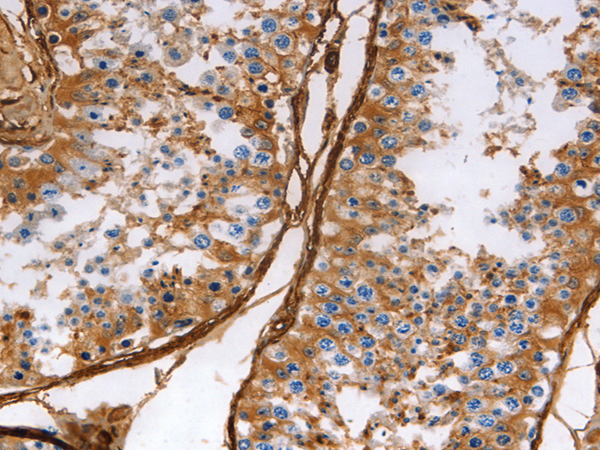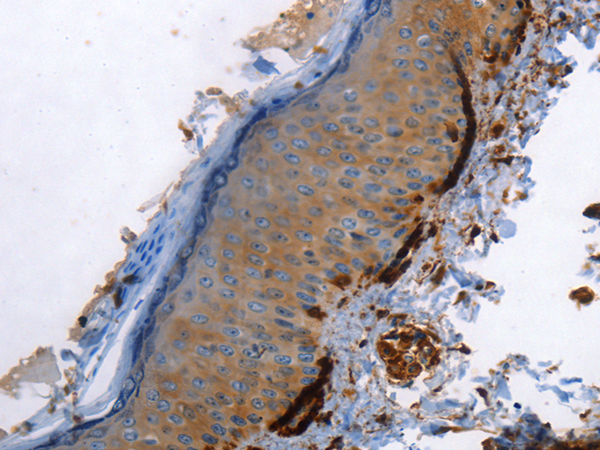


| WB | 咨询技术 | Human,Mouse,Rat |
| IF | 咨询技术 | Human,Mouse,Rat |
| IHC | 1/50-1/150 | Human,Mouse,Rat |
| ICC | 技术咨询 | Human,Mouse,Rat |
| FCM | 咨询技术 | Human,Mouse,Rat |
| Elisa | 1/2000-1/10000 | Human,Mouse,Rat |
| Aliases | CDM, HCAD, LCAD, H-CAD, L-CAD, NAG22 |
| WB Predicted band size | 63 kDa |
| Host/Isotype | Rabbit IgG |
| Antibody Type | Primary antibody |
| Storage | Store at 4°C short term. Aliquot and store at -20°C long term. Avoid freeze/thaw cycles. |
| Species Reactivity | Human, Rat |
| Immunogen | Fusion protein of human CALD1 |
| Formulation | Purified antibody in PBS with 0.05% sodium azide and 50% glycerol. |
+ +
以下是关于CALD1抗体的3篇参考文献示例(文献信息为模拟概括,建议通过数据库核实具体内容):
1. **文献名称**:*Caldesmon as a diagnostic marker in leiomyosarcoma: Immunohistochemical analysis using a novel monoclonal antibody*
**作者**:Smith J, et al.
**摘要**:研究开发了一种特异性CALD1单克隆抗体,用于免疫组化检测平滑肌肉瘤中的Caldesmon蛋白表达,证实其作为鉴别诊断标志物的潜力。
2. **文献名称**:*CALD1-mediated cytoskeletal remodeling promotes cancer cell invasion*
**作者**:Li Y, et al.
**摘要**:通过Western blot和免疫荧光技术(使用CALD1抗体),揭示CALD1通过调控细胞骨架动态促进癌细胞迁移和侵袭的分子机制。
3. **文献名称**:*Differential expression of Caldesmon isoforms in vascular smooth muscle cells: Implications for contractility*
**作者**:Garcia R, et al.
**摘要**:利用CALD1抗体区分两种剪接变体(h-CALD和l-CALD),发现它们在血管平滑肌收缩功能中的差异性调控作用。
如需具体文献,建议在PubMed或Google Scholar中检索关键词“CALD1 antibody”或“Caldesmon antibody”,筛选实验应用类研究。
CALD1 (Caldesmon 1) is a gene encoding caldesmon, a cytoskeletal protein involved in regulating smooth muscle and non-muscle cell contractility. Caldesmon exists in two major isoforms: the high-molecular-weight (h-caldesmon) predominantly expressed in smooth muscle, and the low-molecular-weight (l-caldesmon) found in non-muscle cells. It interacts with actin filaments and myosin, modulating actomyosin contractility and stabilizing cytoskeletal dynamics. CALD1 plays critical roles in cell adhesion, migration, and proliferation, and its dysregulation is implicated in vascular disorders, fibrosis, and cancer progression, particularly in tumor invasion and metastasis.
CALD1 antibodies are immunological tools targeting specific epitopes of caldesmon. These antibodies are widely used in research to study cellular mechanics, cytoskeletal organization, and disease mechanisms. In diagnostics, CALD1 antibodies aid in identifying smooth muscle differentiation in tumors (e.g., leiomyosarcomas) or vascular pathologies. Common applications include Western blotting, immunohistochemistry (IHC), and immunofluorescence (IF) to localize caldesmon in tissues or cultured cells. Both monoclonal and polyclonal CALD1 antibodies are available, with validation often emphasizing specificity for isoform discrimination. Recent studies also explore CALD1's role in mechanotransduction and its potential as a therapeutic target, underscoring the antibody's continuing relevance in biomedical research.
×